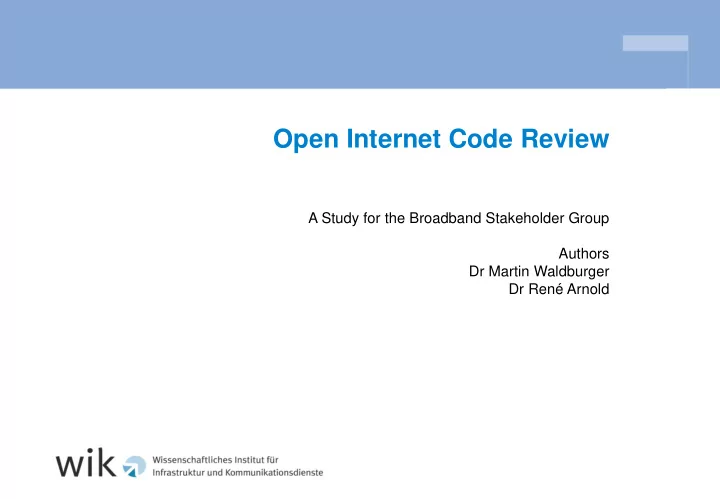

Open Internet Code Review A Study for the Broadband Stakeholder Group Authors Dr Martin Waldburger Dr René Arnold 0
Context EU-Regulation (10788/15) Connected Continent Regulation Part 1 Safeguarding the Open Internet Part 2 Abolition of Surplus Roaming Charges in Europe 1
Context 2 Codes of Practice to Foster Competition and Transparency Established in 2011 Traffic Management Transparency Code Established in 2012 Open Internet Code of Practice 2
Objectives Assess the value of the UK’s self-regulatory approach in the context of the Connected Continent Regulation Assess the effectiveness of the Codes their principles and their impact on UK users Assess the compliance of the Codes in the context of the Connected Continent Regulation Propose a vision for the Codes in the context of the Connected Continent Regulation 3
The Value of the UK‘s Self-Regulatory Approach Particularly well-suited for competitive and innovative sectors with many new entrants Based on social norms and conduct of peers their performance is usually better than government regulation Drawn up by industry experts, rules are more appropriate as they profit from first-hand knowledge In practice, the dialogue around the Codes has been just as important as the Codes themselves 4
The Codes‘ Effectiveness Today signatories to the Codes cover More Than 90% of all UK Internet Subscriptions covered by signatories to the Codes All UK Internet subscriptions not covered 5
The Codes‘ Effectiveness Signatories’ KFIs clearly show Prevalence of Full Internet Access Service Products The overwhelming majority of IAS products offer full access to all legal content Blocking is done to protect consumers from spam or bill shocks 6
The Codes‘ Effectiveness Signatories’ KFIs clearly show Absence of negative discrimination All signatories refrain from continuous throttling of specific contents or applications 7
The Codes‘ Effectiveness Consumer and competition profit as KFIs make traffic management transparent 8
What Do Signatories of the Codes Think? Stakeholders agree that the Codes have met their goals The Codes have fully achieved the objective of ensuring… 6.3 Prevalence of full IAS products in the UK 6.0 Full transparency for consumers 6.2 Flexibility for stakeholders in a changing market 6.0 Effective process for complaint resolution 6.7 Prevention of negative discrimination 9 out of 7 Scale from 1=“not at all achieved” to 7=“fully achieved”
Compliance of the Codes Concept or principle in the Codes Concept of the Open Internet Compliance assessment Proposals to adapt the Codes Codes go further Regulation goes Concept not than Regulation further than covered in Codes Regulation Compliant Update the (with minor updates) concept to reach - - - compliance 10
Compliance of the Codes Concept or principle in the Codes Principle not to block legal content, applications and services or categories thereof Compliance assessment Proposals to adapt the Codes Codes go further Regulation goes Concept not than Regulation further than covered in Codes Regulation Compliant Address the gaps in the Codes ✓ - - 11
Compliance of the Codes Concept or principle in the Codes Products that offer full Internet access are the norm Compliance assessment Proposals to adapt the Codes Codes go further Regulation goes Concept not than Regulation further than covered in Codes Regulation Compliant Maintain unaltered as the Code adds ✓ - - value 12
Compliance of the Codes Concept or principle in the Codes Ability to offer alternative types of products Compliance assessment Proposals to adapt the Codes go further Regulation goes Concept not Codes than Regulation further than covered in Codes Regulation Compliant Develop a clear (assuming that alternative products are outside of understanding Regulation’s scope/application) of these products ✓ - - 13
Compliance of the Codes Concept or principle in the Codes Right to develop and offer managed services Compliance assessment Proposals to adapt the Codes Codes go further Regulation goes Concept not than Regulation further than covered in Codes Regulation Compliant Address the (need to establish additional prerequisites) gaps in the Codes ✓ - - 14
Compliance of the Codes Concept or principle in the Codes Reasonable traffic management Compliance assessment Proposals to adapt the Codes Codes go further Regulation goes Concept not than Regulation further than covered in Codes Regulation Partially compliant Develop a set of (reconsider some traffic management practices) compliant traffic management ✓ - - (good) practices 15
Compliance of the Codes Concept or principle in the Codes Transparency about traffic management practices - KFIs Compliance assessment Proposals to adapt the Codes Codes go further Regulation goes Concept not than Regulation further than covered in Codes Regulation Compliant Maintain unaltered as the Code adds ✓ - - value 16
Compliance of the Codes Concept or principle in the Codes Monitoring of the commitments Compliance assessment Proposals to adapt the Codes Codes go further Regulation goes Concept not than Regulation further than covered in Codes Regulation Compliant Maintain unaltered - - - 17
Compliance of the Codes Concept or principle in the Codes Voluntary process for raising concerns Compliance assessment Proposals to adapt the Codes Codes go further Regulation goes Concept not than Regulation further than covered in Codes Regulation Compliant Maintain unaltered - - - 18
Vision for the Codes Based on our review, we have developed a General vision Stakeholders agree that there needs to be a fitting and consistent interpretation of the Regulation By defining good practices and anticipating future market developments the Codes could once again be ahead of their time 19
Our Recommendations Recommendation 1 merging of the two Codes Recommendation 2 provide consistent guidance for the UK market as regards the Regulation Recommendation 3 proactively address services other than IAS Recommendation 4 improve KFIs further in light of current research insights Recommendation 5 maintain Ofcom’s position and complaint process 20
WIK Wissenschaftliches Institut für Infrastruktur und Kommunikationsdienste GmbH Postfach 2000 53588 Bad Honnef Tel.: +49 2224-9225-0 Fax: +49 2224-9225-68 eMail: info@wik.org www.wik.org
Recommend
More recommend